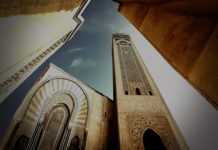In the Holy Qur’an the word Khamr has been used for alcoholic drinks. During the days of the Holy Prophet Muhammad (peace be upon him) the sources of alcoholic beverages were grapes, dates, wheat, barley and honey. Although alcohol may be prepared nowadays from any other source, it is still considered to be forbidden as long as it intoxicates people. Islam emphasises the effects of alcohol on people and not the origin or form of alcohol.
Islam dealt with the problem of alcohol and intoxicants in an excellent way. The information relating to the prohibition of alcohol in Islam is to be obtained directly from the word’s of Allah alone in the Qur’an as well as from the saying of the Holy Prophet Muhammad (peace be upon him) in the Hadith. The prohibition of alcoholic beverages is mentioned three times in the Holy Qur’an.
ln Surah Al-Baqarah, Allah says:
“They question thee about strong drinks and games of chance. Say: In both is great sin, and (some) utility for men; but the sin of them is greater than their usefulness.”Al-Qur’an 2:219
There is a great sin in wine drinking and one of the things that Allah forbade is sins. The last portion of the verse tells us that there is greater harm in wine and gambling than the benefit. No sane man will approach or do anything that has a greater harm than benefit for him.
ln Surah An-Nisa, Allah says:
“O ye who believe! Draw not near unto prayer when ye are drunken, till ye know that which ye utter … “Al-Qur’an 4:43
There are some ignorant and misguided Muslims who try to argue on the basis of this verse that the Qur’an has not specifically prohibited Khamr. They tend to forget that it refers to the time before intoxicants were prohibited. Before the prohibition of intoxicants altogether was promulgated, it was at least unbecoming that people should come to prayers in a state of intoxication or in a dazed state of mind on account of drowsiness or some other cause. Islam regards prayers as a monologue between a Muslim and the Creator of the universe. So he is prohibited to approach this monologue while he is drunk. He must purify himself first before he approaches Salat. He must be pure in mind and body, therefore, he must be sober. He must be clean in clothes too.
Salat (prayer) is Islam’s most important act of worship. The Holy Prophet said : “Prayer is the pillar of Islam. The one who performs it has established his religion and the one who abandons it has ruined (his) religion.” That is why some of the leading Muslim jurists consider that person as murtad (renegade) who abandons his prayers altogether.
In Surah Al-Maidah, Allah says:
“O ye who believe ! Strong drinks and games of chance and idols and divining of arrows are only an infamy of Satan’s handiwork. Leave it aside in order that ye may succeed. Satan seeketh only to cast among you enmity and hatred by means of strong drink and games of chance, and turn you from remembrance of Allah and from (His) worship. So will ye not then abstain?”Al-Qur’an 5:90-91
These three passages from the Qur’an (2:219, 4:43 and 5:90-91) are related to the prohibition of alcoholic beverages. They were revealed in the above order but on different times and occasions. The last verse (5:91) makes the prohibition of alcohol categorical.
We are told in the last revealed verses on intoxicants that drinks, gambling etc., are abomination of Satan’s handicraft. We must, therefore, be very careful about the instigations of our mortal enemy – Satan. That is why we are to rid ourselves of all abominable things.
Another point from these ayat is that Satan wants to excite enmity and hatred between us. We want to live happily and friendly and no hatred is to be aroused. So when the final stage of prohibition was revealed in the third year after the Battle of Uhud, it was only to be announced before the Muslims that liquor and drug were not to be taken by a Muslim. When the reciters of the revealed verse reached “will ye not then abstain?” all Muslims said, “We have really abstained, O Allah”. Hence they poured on the earth all the drinks that remained whether it was in a jar, mug or in anything else. They also spat out what was in their mouths.
The Messenger of Allah (may blessings and peace of Allah be upon him) ordered people to throw away all drinks that was in their possession. Soon after the revelation, some of the companions came back and told the Prophet that there was some drink that belonged to some orphans, what were they to do about this; spill it or leave it. He ordered the companions to throw away all drinks, no matter to whom they belonged.
Had it not been Haram (unlawful), the Prophet (peace be upon him) wouldn’t have ordered them to throw it away. Had he not, the Apostle of Allah (may blessings and peace of Allah be upon him), understood that alcohol was Haram, he wouldn’t have forbidden Muslims from drinking.
Had it not been unlawful, the Messenger of Allah wouldn’t have cursed it, as well as the brewer or winemaker, the drinker, the buyer, the server (waiter) and those present at the party. And the Prophet (peace be upon him) wouldn’t have ordered that the drinker was to be flogged.[1]
Muslims are told to eschew such abominations. This term emphasized the subject better than mere prohibition. It means that the Apostle of Allah translated the teachings of the Holy Qur’an by his deeds and sayings, i.e. he not only preached but practised the teachings of the Holy Qur’an.
There is a very good collection of Ahadith (sayings of the Prophet) dealing with intoxicants. Some of these are given below:
1. Ibn ‘Umar reported the Messenger of Allah as saying, “Every intoxicant is Khamr and very intoxicant is haram (forbidden).” [Muslim]
2. ‘A’ishah (may Allah be pleased with her) said that when Allah’s Messenger was asked about bit which is the nabidh[2] from honey, he replied, “Every liquor which intoxicates is forbidden.” [Bukhari & Muslim]
3. Umm Salamah (may Allah be pleased with her) reported that Allah’s Messenger prohibited all intoxicants and drinks that slacken a person’s mind. [Abu Dawud]
4. ‘Abdullah ibn Abbas narrated that the Prophet said, “Abstain from Khamr because it is the key (source) of all evils.” [Abu Dawud]
5. Abu Hurayrah reported the Messenger of Allah as saying, “When one commits fornication he is not a believer, when one steals he is not a believer, when one drinks Khamr (wine) he is not a believer … ” [Bukhari & Muslim] This Hadith implies that one cannot remain a true Muslim, while disobeying Allah’s laws by committing any of these great sins.
6. Anas said that the Messenger of Allah cursed ten people in connection with wine: the wine-presser, the one who has it pressed, the one who drinks it, the one who conveys it, the one to whom it is conveyed, the one who serves it, the one who sells it, the one who benefits from the price paid for it, the one who buys it, and the one for whom it is bought. [Tirmidhi and Ibn Majah]
7. Wa’il al-Hadrami said that Tariq ibn Suwayd asked the Prophet about wine and he forbade him. When he told him that he made it only as a medicine he replied, “It is not a medicine, but is disease.” [Muslim]
8. Jabir told of a man who came from the Yemen and asked the Prophet about a liquor made from millet called mizr which they drank in their country. The Prophet asked whether it was intoxicating and when he replied that it was, he said, “Every intoxicant is prohibited. Allah has made a covenant regarding those who drink intoxicants to give them some tinat al-khabal to drink.” He was asked what that was and replied that it was the sweat of the inhabitants of hell, or the discharge of the inhabitants of Hell. [Muslim]
9. It is reported that Daylam al-Himyari said, “O Messenger of Allah. We live in a cold land in which we do heavy work and we make a liquor from wheat to get strength from it for our work and to stand the cold of our country.” He asked whether it was intoxicating, and when be replied that it was, he said they must avoid it. When he replied that the people would not abandon it, he said, “If they do not abandon it fight with them.” [Abu Dawud]
10. Jabir reported the Messenger of Allah as saying, “If a large amount of anything causes intoxication, a small amount of it is prohibited.” [At-Tirmidhi, Abu Dawud and Ibn Majah]
11. ‘A’ishah (may Allah be pleased with her) reported Allah’s Messenger as saying, “If a faraq (about eight kilograms) of anything causes intoxication a handful of it is forbidden.” [Ahmad, At-Tirmidhi and Abu Dawud]. To drink as much as faraq would be almost impossible, so the point of the Hadith is to forbid anything which might in any conceivable circumstances cause intoxication. If a habitual drunkard does not lose control over himself altogether, it does not mean that the liquor ceases to be forbidden. Islam has made certain foods and drinks unlawful primarily on the basis of the pernicious effects that these create on the spiritual and moral health of human beings. Drinking is an evil through and through. It saps the very root of morality, self-control and God-consciousness, making man an easy prey to evil.
12. ‘Abdullah ibn Amr reported that the Prophet forbade wine, maysir, the kuba and ghubayra, saying, “Every intoxicant is prohibited.” [Abu Dawud] This is a comprehensive Hadith not exclusively dealing with intoxicants. Maysir was a game of chance and kuba was a kind of drum wide at the ends and narrow in the middle which was looked on with disapproval. The parts of the Hadith which refer to intoxicants are the wine (khamr) and ghubayra which was an intoxicant made by Abyssinians from millet.
13. ‘Abdullah ibn ‘Umar reported Allah’s Messenger as saying, “If anyone drinks wine God will not accept prayer from him for forty days, but if he repents God will forgive him. If he repeats the offence God will not accept prayer from him for forty days, but if he repents God will forgive him. If he again repeats the offence God will not accept prayer from him for forty days, but if he repents God will forgive him. If he repeats it a fourth time God will not accept prayer from him for forty days, and if he repents God will not forgive him, but will give him to drink of the river of the fluid flowing from the inhabitants of Hell.” [At-Tirmidhi]
14. ‘Abdullah ibn Amr reported the Prophet as saying, “An undutiful son, a gambler, one who casts up what he has given, and one who is addicted to wine will not enter Paradise.” [Ad-Darimi] Another version of his has a bastard instead of a gambler.
15. Abu Umama reported the Prophet as saying, “Allah has sent me as a mercy to the universe and as a guidance to the universe, and my Lord who is great and glorious has commanded me to annihilate stringed instruments, wind instruments, idols, crosses and pre-Islamic customs, and my Lord who is great and glorious has sworn, ‘By my might, none of my servants will drink a mouthful of wine without my giving him a similar amount of pus to drink, but he will not abandon it through fear of Me without my giving him drink from the holy tanks.'” [Ahmad]
16. Ibn ‘Umar reported Allah’s Messenger as saying, “There are three to whom God has forbidden Paradise; one who is addicted to wine, an undutiful son, and a cuckold who agrees to his women-folk’s adultery.” [Ahmad and An-Nasa’i]
17. Abu Musa al-Ash’ari reported the Prophet as saying, “There are three who will not enter Paradise: one who is addicted to wine, one who breaks ties of relationship, and one who believes in magic.” [Ahmad]
18. In another Hadith it is reported on behalf of the Prophet that he said, “Liquor is the mother of many evils and it is the most shameful of all evils: anyone who drinks liquor, will neglect prayer, and may commit incestuous offences.”
19. Al-Hakim narrated that the Prophet (peace and blessings of Allah be upon him) said : “He who commits adultery, fornication, or drinks wine, Allah removes that person’s faith from him in the same way as one takes off one’s clothing.”
20. Ahmad narrates that the Prophet said: “He who dies and has not abstained from drinking, Allah will make him drink from the river of Al-Ghota (a river flowing from the sex organs of the prostitutes). The people of Hell will be perturbed by the nasty smell from the sex organs of the prostitutes.”
21. ‘Umar narrates: I heard the Prophet say: “He who believes in Allah and the Last Day should not sit at a table on which people drink.”
22. Abu Hurairah narrates that the Prophet said, “The drinker of wine is like the worshipper of idols.” [Ibn Majah]















































